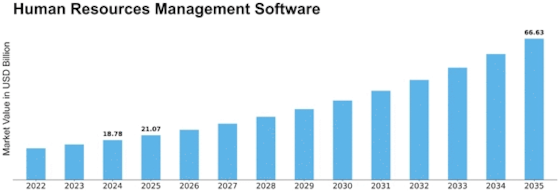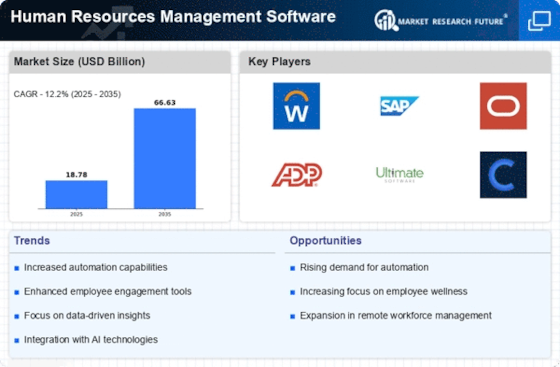-
Executive Summary
-
Scope of the Report
-
Market Definition
-
Scope of the Study
- Research Objectives
- Assumptions & Limitations
-
Markets Structure
-
Market Research Methodology
-
Research Process
-
Secondary Research
-
Primary Research
-
Forecast Model
-
Market Landscape
-
Porter’s Five Forces Analysis
- Threat of New Entrants
- Bargaining power of buyers
- Threat of substitutes
- Rivalry
- Bargaining Power of Suppliers
-
Value Chain/Supply Chain of Human Resource Management Software Market
-
Market Overview of Human Resource Management Software
-
Introduction
-
Growth Drivers
-
Impact Analysis
-
Market Challenges
-
Market Trends
-
Introduction
-
Growth Trends
-
Impact analysis
-
Human Resource Management Software by Deployment
-
Introduction
-
On-Premise
- Market Estimates & Forecast, 2020–2030
- Market Estimates & Forecast by Region, 2020–2030
-
On-Cloud
- Market Estimates & Forecast, 2020–2030
- Market Estimates & Forecast by Region, 2020–2030
-
Human Resource Management Software Market by Organization Size
-
Introduction
-
Small and Medium Enterprises
- Market Estimates & Forecast, 2020–2030
- Market Estimates & Forecast by Region, 2020–2030
-
Large Enterprises
- Market Estimates & Forecast, 2020–2030
- Market Estimates & Forecast by Region, 2020–2030
-
Human Resource Management Software Market by Solution
-
Introduction
-
Work Force Management
- Market Estimates & Forecast, 2020–2030
- Market Estimates & Forecast by Region, 2020–2030
-
Sourcing and Recruitment
- Market Estimates & Forecast, 2020–2030
- Market Estimates & Forecast by Region, 2020–2030
-
Applicant Tracking System
- Market Estimates & Forecast, 2020–2030
- Market Estimates & Forecast by Region, 2020–2030
-
Talent Management
- Market Estimates & Forecast, 2020–2030
- Market Estimates & Forecast by Region, 2020–2030
-
Others
- Market Estimates & Forecast, 2020–2030
- Market Estimates & Forecast by Region, 2020–2030
-
Human Resource Management Software Market by Service
-
Introduction
-
Integration and Deployment
- Market Estimates & Forecast, 2020–2030
- Market Estimates & Forecast by Region, 2020–2030
-
Support and Maintenance
- Market Estimates & Forecast, 2020–2030
- Market Estimates & Forecast by Region, 2020–2030
-
Training and Consulting
- Market Estimates & Forecast, 2020–2030
- Market Estimates & Forecast by Region, 2020–2030
-
Human Resource Management Software Market by Verticals
-
Introduction
-
BFSI
- Market Estimates & Forecast, 2020–2030
- Market Estimates & Forecast by Region, 2020–2030
-
Telecom and IT
- Market Estimates & Forecast, 2020–2030
- Market Estimates & Forecast by Region, 2020–2030
-
Public Sector
- Market Estimates & Forecast, 2020–2030
- Market Estimates & Forecast by Region, 2020–2030
-
Manufacturing
- Market Estimates & Forecast, 2020–2030
- Market Estimates & Forecast by Region, 2020–2030
-
Retail
- Market Estimates & Forecast, 2020–2030
- Market Estimates & Forecast by Region, 2020–2030
-
Healthcare
- Market Estimates & Forecast, 2020–2030
- Market Estimates & Forecast by Region, 2020–2030
-
Transportation and Logistics
- Market Estimates & Forecast, 2020–2030
- Market Estimates & Forecast by Region, 2020–2030
-
Others
- Market Estimates & Forecast, 2020–2030
- Market Estimates & Forecast by Region, 2020–2030
-
Human Resource Management Software Market by Region
-
Introduction
-
North America
- Market Estimates & Forecast, by Country, 2020–2030
- Market Estimates & Forecast by Deployment, 2020–2030
- Market Estimates & Forecast by Organization Size, 2020–2030
- Market Estimates & Forecast by Solution, 2020–2030
- Market Estimates & Forecast by Service, 2020–2030
- Market Estimates & Forecast by Vertical, 2020–2030
- U.S.
- Mexico
- Canada
-
Europe
- Market Estimates & Forecast, by Country 2020–2030
- Market Estimates & Forecast by Deployment, 2020–2030
- Market Estimates & Forecast by Organization Size, 2020–2030
- Market Estimates & Forecast by Solution, 2020–2030
- Market Estimates & Forecast by Service, 2020–2030
- Market Estimates & Forecast by Vertical, 2020–2030
- Germany
- France
- U.K
- Rest of Europe
-
Asia Pacific
- Market Estimates & Forecast, by Country, 2020–2030
- Market Estimates & Forecast by Deployment, 2020–2030
- Market Estimates & Forecast by Organization Size, 2020–2030
- Market Estimates & Forecast by Solution, 2020–2030
- Market Estimates & Forecast by Service, 2020–2030
- Market Estimates & Forecast by Vertical, 2020–2030
- China
- India
- Japan
- Rest of Asia Pacific
-
Rest of the World
- Market Estimates & Forecast, by Country, 2020–2030
- Market Estimates & Forecast by Deployment, 2020–2030
- Market Estimates & Forecast by Organization Size, 2020–2030
- Market Estimates & Forecast by Solution, 2020–2030
- Market Estimates & Forecast by Service, 2020–2030
- Market Estimates & Forecast by Vertical, 2020–2030
- The Middle East & Africa
- Latin Countries
-
Company Profiles
-
Workday, Inc. (U.S.)
- Company Overview
- Product/Business Segment Overview
- Financial Updates
- Key Developments
-
SAP SE (Germany)
- Company Overview
- Product/Business Segment Overview
- Financial Updates
- Key Developments
-
Kronos, Inc. (U.S.)
- Company Overview
- Product/Business Segment Overview
- Financial Updates
- Key Developments
-
Oracle Corporation (U.S.)
- Company Overview
- Product/Business Segment Overview
- Financial Updates
- Key Developments
-
Automatic Data Processing, LCC (U.S.)
- Company Overview
- Product/Business Segment Overview
- Financial Updates
- Key Developments
-
Talentsoft (France)
- Company Overview
- Product/Business Segment Overview
- Financial Updates
- Key Developments
-
Ultimate Software Group, Inc. (U.S.)
- Company Overview
- Product/Business Segment Overview
- Financial Updates
- Key Developments
-
Accenture PLC (Ireland)
- Company Overview
- Product/Business Segment Overview
- Financial Updates
- Key Developments
-
Cezanne HR Ltd. (U.K.)
- Company Overview
- Product/Business Segment Overview
- Financial Updates
- Key Developments
-
International Business Machines Corporation (U.S.)
- Company Overview
- Product/Business Segment Overview
- Financial Updates
- Key Developments
-
Ultimate Software (U.S.)
- Company Overview
- Product/Business Segment Overview
- Financial Updates
- Key Developments
-
PricewaterhouseCoopers (India)
- Company Overview
- Product/Business Segment Overview
- Financial Updates
- Key Developments
-
NetSuite, Inc. (U.S.)
- Company Overview
- Product/Business Segment Overview
- Financial Updates
- Key Developments
-
Mercer LLC (U.S.)
- Company Overview
- Product/Business Segment Overview
- Financial Updates
- Key Developments
-
Ceridian HCM, Inc. (U.S.)
- Company Overview
- Product/Business Segment Overview
- Financial Updates
- Key Developments
-
Conclusion
-
-
LIST OF TABLES
-
Table1 Global Human Resource Management Software Market: By Country, 2020–2030
-
Table2 North America Human Resource Management Software Market: By Country, 2020–2030
-
Table3 Europe Human Resource Management Software Market: By Country, 2020–2030
-
Table4 Asia Pacific Human Resource Management Software Market: By Country, 2020–2030
-
Table5 North America Human Resource Management Software Market, By Country
-
Table6 North America Human Resource Management Software Market, By Deployment
-
Table7 North America Human Resource Management Software Market, By Organization Size
-
Table8 North America Human Resource Management Software Market, By Solution
-
Table9 North America Human Resource Management Software Market, By Service
-
Table10 North America Human Resource Management Software Market, By Vertical
-
Table11 Europe Human Resource Management Software Market, By Country
-
Table12 Europe Human Resource Management Software Market, By Deployment
-
Table13 Europe Human Resource Management Software Market, By Organization Size
-
Table14 Europe Human Resource Management Software Market, By Solution
-
Table15 Europe Human Resource Management Software Market, By Service
-
Table16 Europe Human Resource Management Software Market, By Vertical
-
Table17 Asia Pacific Human Resource Management Software Market, By Country
-
Table18 Asia Pacific Human Resource Management Software Market, By Deployment
-
Table19 Asia Pacific Human Resource Management Software Market, By Organization Size
-
Table20 Asia Pacific Human Resource Management Software Market, By Solution
-
Table21 Asia Pacific Human Resource Management Software Market, By Service
-
Table22 Asia Pacific Human Resource Management Software Market, By Vertical
-
Table23 The Middle East & Africa Human Resource Management Software Market, By Deployment
-
Table24 The Middle East & Africa Human Resource Management Software Market, By Organization Size
-
Table25 The Middle East & Africa Human Resource Management Software Market, By Solution
-
Table26 The Middle East & Africa Human Resource Management Software Market, By Service
-
Table27 The Middle East & Africa Human Resource Management Software Market, By Vertical
-
Table28 Latin America Human Resource Management Software Market, By Deployment
-
Table29 Latin America Human Resource Management Software Market, By Organization Size
-
Table30 Latin America Human Resource Management Software Market, By Solution
-
Table31 Latin America Human Resource Management Software Market, By Service
-
Table32 Latin America Human Resource Management Software Market, By Vertical
-
LIST OF FIGURES
-
Global Human Resource Management Software market segmentation
-
Forecast Methodology
-
Porter’s Five Forces Analysis of Human Resource Management Software Market
-
Value Chain of Human Resource Management Software Market
-
Share of Human Resource Management Software Market in 2020, by country (in %)
-
Global Human Resource Management Software Market, 2020–2030,
-
Global Human Resource Management Software Market size by Deployment, 2020
-
Share of Global Human Resource Management Software Market by Deployment, 2020 to 2030
-
Global Human Resource Management Software Market size by Organization Size, 2020
-
Share of Human Resource Management Software Market by Organization Size, 2020 to 2030
-
Global Human Resource Management Software Market size by Solution, 2020
-
Share of Global Human Resource Management Software Market by Solution, 2020 to 2030
-
Global Human Resource Management Software Market size by Service, 2020
-
Share of Global Human Resource Management Software Market by Service, 2020 to 2030
-
Global Human Resource Management Software Market Size by Vertical, 2020
-
Share of Global Human Resource Management Software Market Size by Vertical, 2020
-
"



















Leave a Comment